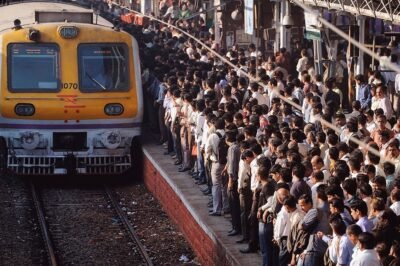A massive power supply failure by Tata Power disrupted Central Railway services in Mumbai, affecting operations across key routes on Thursday. The outage impacted trains on the Kalyan-Kasara-Igatpuri and Kalyan-Karjat-Lonavala sections, covering over 150 kilometers. Thousands of commuters were left stranded as delays cascaded throughout the network, leading to widespread inconvenience and operational challenges.
Details of the Power Failure
The disruption occurred due to an unexpected power supply failure by Tata Power, which supplies electricity to the railway network. The affected routes, critical for Mumbai’s daily commuters and long-distance travelers, witnessed a complete halt in operations during peak hours.
Key sections impacted included:
- Kalyan-Kasara-Igatpuri Section: This route connects Mumbai to central and northern parts of India.
- Kalyan-Karjat-Lonavala Section: A crucial link for commuters traveling to Pune and surrounding areas.
Efforts to restore power took several hours, during which services were either delayed or canceled, leaving passengers frustrated.
Impact on Commuters
The power failure caused significant disruptions, including:
- Train Delays: Several local and long-distance trains were delayed by up to three hours, throwing schedules into disarray.
- Cancellations: Many services were canceled, further compounding commuter woes.
- Overcrowding: Stations along the affected routes were overcrowded as passengers waited for updates or alternative transport options.
One commuter remarked, “It was chaotic. There was no clarity on when services would resume. People were stranded for hours.”
Operational Challenges for Central Railway
The outage posed significant operational hurdles for Central Railway, including:
- Restoration Delays: Despite quick action by the technical teams, restoring power to such a large network took time due to the scale of the disruption.
- Coordination with Tata Power: Constant communication was required between railway officials and Tata Power to expedite resolution.
- Passenger Management: Managing stranded passengers at stations and ensuring safety during the disruption added to the challenges.
Government and Official Response
Railway authorities and Tata Power issued statements acknowledging the disruption and expressed regret for the inconvenience caused. Officials assured commuters that measures would be taken to prevent such incidents in the future.
The Central Railway spokesperson stated, “Efforts are underway to ensure a smoother restoration process. We are also reviewing backup systems to handle such emergencies better.”
Economic and Social Implications
The disruption had broader implications:
- Economic Losses: Delays affected not just commuters but also goods transportation, potentially impacting business operations across sectors.
- Commuter Productivity: Stranded passengers reported missed appointments, delayed work commitments, and increased travel costs due to reliance on alternative transport.
- Public Sentiment: The incident highlighted vulnerabilities in Mumbai’s critical infrastructure, sparking discussions about the need for resilient systems.
Steps Forward: Enhancing Resilience
To prevent future disruptions, authorities must focus on:
- Improving Backup Systems: Investing in alternative power sources and redundancies for uninterrupted railway operations.
- Streamlining Communication: Enhancing real-time updates for passengers to reduce confusion during service disruptions.
- Collaborating with Power Suppliers: Strengthening partnerships with electricity providers to ensure reliable power supply and quicker resolutions during outages.
- Modernizing Infrastructure: Upgrading railway and power grid infrastructure to handle increased demand and unforeseen challenges.
Conclusion
The Tata Power supply failure that disrupted Central Railway services underscores the critical importance of reliable infrastructure in urban mobility. While restoration efforts mitigated the immediate crisis, the incident highlights the need for long-term solutions to prevent similar occurrences. As Mumbai’s lifeline, the railway network must be equipped with robust backup systems to ensure uninterrupted services for the millions of passengers who depend on it daily.








Leave a Reply